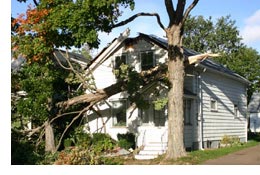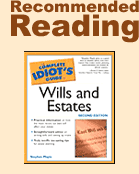Ten Post-Disaster
Money Tips
1. Review your insurance coverage and file claims as soon as possible.
2. Locate your credit cards. Immediately call the issuers if you can’t find them.
3. Use credit cards prudently to save you from overwhelming balances later.
4. Know your credit limits. If you absolutely have to exceed them, request higher limits rather than going over to avoid costly penalties.
5. Avoid using cash advances. Interest, usually at a high rate, accrues immediately.
6. Reject credit and loan offers that seem too easy to obtain, list a 900 number (you could be calling out of country), or charge you a fee before you receive money.
7. Reject unsolicited and fee-based offers to fill out loan and grant applications. Contact your financial institution or legitimate assistance agency if you need help.
8. Develop a financial priority list. Your budget may be seriously affected by reduced income and increased expenses, so consider each line item carefully.
9. Keep the bulk of your money in your financial institution. Cash in pocket is far riskier than cash in a checking or savings account.
10. If you are unable to meet all your financial obligations, communicate with your lenders as soon as possible – you could save your credit history from future damage. |
 For more information on how BALANCE can help you master your money call toll-free: For more information on how BALANCE can help you master your money call toll-free:
888.456.2227
Monday-Thursday
5am-8pm
Friday
5am-5pm
Saturday
8am-5pm (PST) |
|

 Every
once in a while Mother Nature displays her power – delivering
storms that bring on floods, blowing winds that spread wildfire,
and shifting the earth to topple buildings. And if you are not
prepared to deal with the impact of such destructive events, you
could suffer great financial loss. Every
once in a while Mother Nature displays her power – delivering
storms that bring on floods, blowing winds that spread wildfire,
and shifting the earth to topple buildings. And if you are not
prepared to deal with the impact of such destructive events, you
could suffer great financial loss.
Protect yourself with a Personal Finance Disaster Plan. The small amount of planning it requires can preserve a lifetime of earnings.
Be adequately insured
Comprehensive insurance coverage is crucial for all homeowners. Consider adding a guaranteed replacement cost policy so you could rebuild at today’s prices (plus a little extra to meet current building codes). Flood insurance is also a wise investment, as water damage is common and extremely expensive to repair.
If you rent your home, protect your belongings with renters insurance. Premiums are usually low, and it typically covers damaged, destroyed or stolen property. Increase your security with a policy that pays for a hotel if your home becomes uninhabitable.
Whether you rent or own your home, you may want to add even further to your policies if you own jewelry, collectibles, artwork, and furs.
Establish an emergency fund
Having money readily available in the event of a disaster is vital to a quick rebound. Aim to save three to six months of essential expenses. Have a fixed sum deducted from your checking account and automatically deposited into a savings account.
Keep most of your emergency fund in a passbook savings account or money market account, but store a small amount of cash in your home or car. You may not be able to get to your financial institution or an ATM machine for a while.
Keep your credit card balances down
While credit cards are not intended to take the place of an emergency fund, they can be very useful if you need to check into a hotel or rent a car during a crisis. If you currently have credit card debt, concentrate on repaying what you owe.
Plan for your estate
If you have loved ones who depend on you for financial support, it is vital to plan for your estate.
Have a will drawn up. Among other things, it allows you to leave your property to your choice of beneficiaries. Dying without one may lead to court battles that can erode the value of your estate, and assets being transferred to those who may not be your preference.
If you have significant assets, consider setting up a living trust. You can transfer property into the trust and bypass the long and costly probate process.
To further protect your assets, appoint a fiduciary power of attorney. If you become unable to make decisions, he or she will be able to carry out your financial wishes.
Safeguard your financial information
Being organized now will save you from panic later. In a home safe or firebox, keep:
- Enough cash for a few days worth of food and shelter
- Insurance policy documents
- Copies of deeds and titles for your home, car, and other real property
- Copies of previous years income tax returns
- Originals of wills and powers of attorney, if not with your attorney or local registrar
- Backups of computerized financial records
- Checking and savings account, loan, credit card, investment account information
- The key to your safe deposit box
In a safe deposit box, keep:
- Originals of deeds and titles to your home, car and other real property
- Appraisals of expensive jewelry and heirlooms
- Originals of previous years income tax returns
- Certificates for stocks, bonds, and other investments
- Trust agreements
- Copies of wills and powers of attorney, if not with your attorney or local registrar
- Home improvement records
- Household inventory documentation
Though we can’t control Mother Nature’s erratic temperament, we can take steps to reduce the effect her moods may have on our finances. Begin planning your Personal Financial Disaster Plan now, while the skies are clear. When the storm clouds build, you’ll be relieved you did.
|

 For more information on how BALANCE can help you master your money call toll-free:
For more information on how BALANCE can help you master your money call toll-free:
 Every
once in a while Mother Nature displays her power – delivering
storms that bring on floods, blowing winds that spread wildfire,
and shifting the earth to topple buildings. And if you are not
prepared to deal with the impact of such destructive events, you
could suffer great financial loss.
Every
once in a while Mother Nature displays her power – delivering
storms that bring on floods, blowing winds that spread wildfire,
and shifting the earth to topple buildings. And if you are not
prepared to deal with the impact of such destructive events, you
could suffer great financial loss.  The Complete Idiot’s Guide to Wills and Estates
The Complete Idiot’s Guide to Wills and Estates